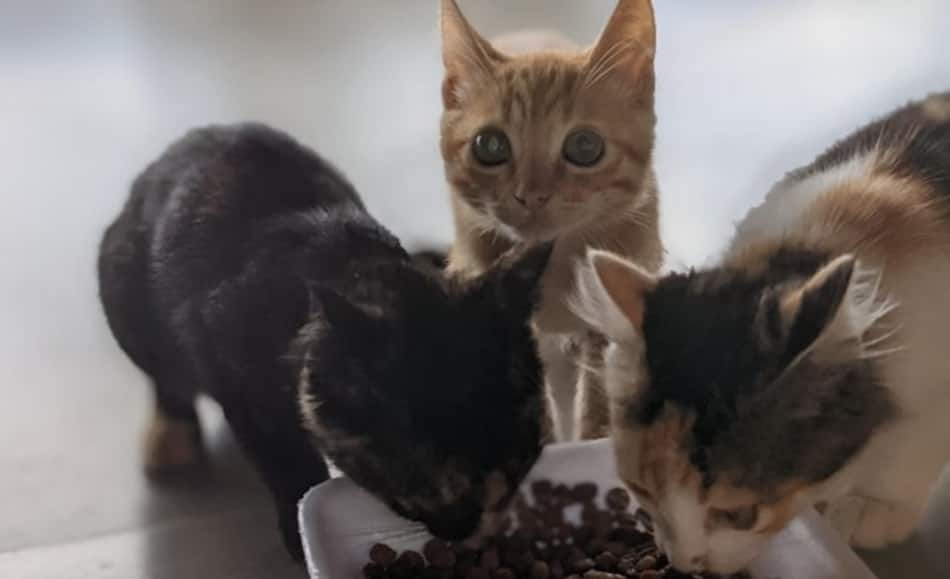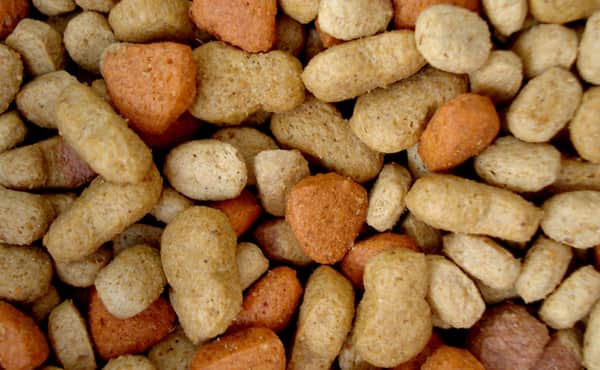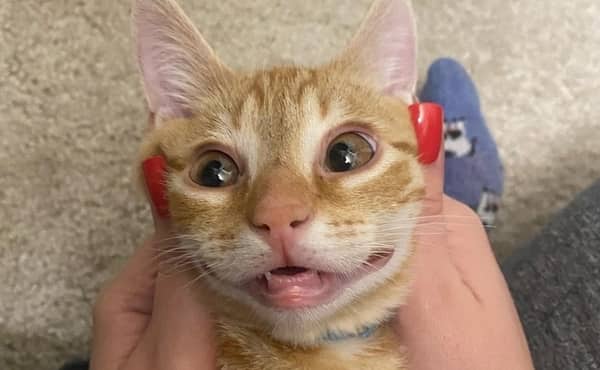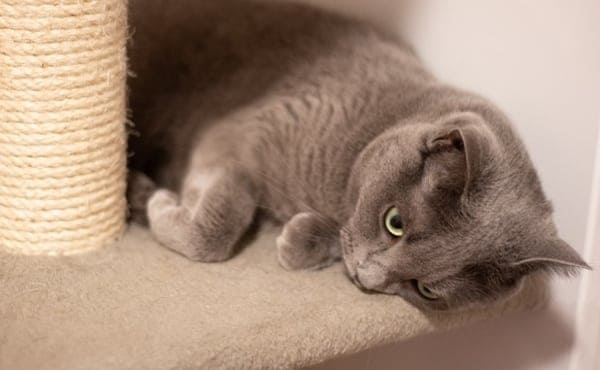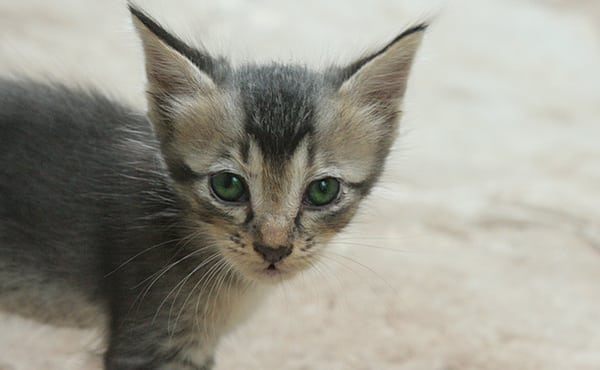Bringing a new pet home, especially a baby, is always extremely exciting, and few baby animals are cuter than kittens! These little balls of fluff and attitude are certainly fun and entertaining, but sometimes they can be worrying too, like if they are only eating wet food.
So, why does my kitten only eat wet food? The most likely reason is that your kitten is simply not accustomed to the texture of dry kibble yet, although there are other factors to consider.
This article will discuss how your kitten’s food preferences or the quality of the food might be affecting its behavior. We will also cover potential dental or teething issues, stress, and the possibility that your kitten is just a fussy eater.
Kibbles and Bits
Cats have been domesticated (rather, they practically domesticated themselves, which will come as a surprise to pretty much no cat owner) for at least 8,000 years, establishing what turned out to be a mutually beneficial relationship with ancient humans by acting as our earliest form of pest control.
The modern housecat’s diet has evolved quite a bit from the days of rodents, birds, and the occasional dish of milk fresh from the cow, but their basic needs have remained the same. Cats are carnivores, meaning they rely almost solely on animal-based protein to live. They need lots of protein, some fat, few carbohydrates, and various micronutrients.
Kittens will grow very quickly in their first few months of life, so they need even more protein, amino acids, and certain vitamins. Because of these differing needs, it is important to make sure you are giving kitten-specific food, both wet and dry.
However, if your kitten is averse to eating the dry food, it is likely that they simply do not like or understand the texture or taste yet.
Depending on your kitten’s age, your home likely is its first exposure to dry food. Prior to this, it probably only had milk from its mother or bottles and wet food. This is entirely normal, so give your little ball of fluff some time to adjust.
To get your kitten accustomed to the taste and texture of dry food, feed the dry food side by side with the wet, gradually increasing the amount of dry food over a period of seven to ten days while decreasing the wet food. You can add a little warm water or warm salt-free chicken broth to the dry food to help ease your kitten into the texture.
Additionally, leave some dry food out throughout the day for your kitten to snack on if it gets hungry. Ideally, your growing feline friend should be fed about four times a day, so make sure they are eating enough if they continue to steer clear of the dry food.
If you know your kitten was eating dry food before you brought it home, determine what kind of food it was and try feeding that instead, as your little pal might be accustomed to that and cannot stomach a quick change to a different food.
If you do not want to feed that food at home, gradually switch to another kitten-specific food over a period of seven to ten days, using the side-by-side method discussed above, so you do not hurt your kitten’s sensitive stomach.
If you do not notice your furry friend adjusting to the dry food after trying these things, read the label on your bag to check the quality of food you are feeding. Cats and kittens need high-quality protein, so if the first ingredient is not meat, your food likely is mostly filler.
Lower quality food might be why your kitten is not eating—it might not like the taste or feeling it gets from eating it. Over time, lower quality food has been linked with long-term health problems and obesity, leading to higher vet bills.
Finally, cats and kittens will eat until they have gotten enough of the nutrients they need, meaning they could end up eating double a lower-quality food to do so, which can lead to obesity. High quality food may cost a bit more at first, but over time you will actually save money, since you will not have to feed as much, and likely should not expect as many vet bills.
If you do not think adjusting to the taste, quality, or texture of dry food seems to be the problem, it is time to rule out any dental issues.
My, What Big Teeth You Have
For quite some time, it was claimed that dry food was necessary for domestic cats to keep their teeth clean. While there may be some truth to this, the evidence for it is actually quite slim. Many veterinarians agree that if you take care of your companion’s teeth and have them checked regularly dry food is not necessary for dental care.
With this in mind, if your kitten never ends up coming around to dry food, it is not the end of the world. A cat will thrive on wet food alone, although feeding both is ideal.
However, if you have been trying to get your furry friend to make the switch for a while and it is simply not happening, there may be some dental issues that make crunching on dry kibbles painful or uncomfortable. First, remember that kittens are babies, and like babies of most species, they go through teething phases.
Kittens teethe twice in their lives—once when their milk teeth come in, and once when their adult teeth come in. Teething for kittens is not quite as painful as it can be for human babies, nor does it usually involve as much wonton chewing as with puppies, but it can result in sore or sensitive gums.
Gum soreness can definitely put a kitten off from trying to crunch kibble for a while. Look for some of these other indicators that your companion is teething to determine if this is the cause for its behavior:
- Missing teeth (have you been finding souvenirs from your pal around the house?)
- Pawing at its face or shaking its head
- Chewing
- Irritability
- Reduced appetite
- Light gum bleeding (heavy bleeding around gums may signal a dental condition)
- Face sensitivity
- Decreased grooming habits
If your kitten is displaying some or all these signs and does not want to eat its dry food, teething is likely the culprit. Do not fear, however, as teething is temporary and should only last one or two months. During this time, offer your pal some toys to chew on for relief and make sure to get them into the veterinarian to ensure its adult teeth are coming in well.
Teething or not, your kitten can also be susceptible to dental issues that may need a veterinarian’s attention. Common dental problems affecting cats and kittens include tartar, plaque, gingivitis, and feline periodontal disease, which affects around 70% of cats.
In addition to difficulty eating, look for bad breath, red and/or swollen gums, tooth discoloration, or drooling as indicators of potential dental issues.
Schedule a visit with your veterinarian if you suspect any problem, as they will clear up with treatment. Prevent these issues by creating a dental hygiene routine for your furry friend at home with regular tooth brushing and at least annual dental checkups with your vet.
Outside of normal adjustment or dental problems, you could also be dealing with stress or illness.
High Anxiety
Cats are known for being cool and collected, but that does not mean they are immune to stress. There are plenty of factors that cause stress in our feline friends, including changes in routine, new residents or guests in the home, an interloper (stray cat or dog, racoon, etc.) crossing through your yard, or in a kitten’s case, moving into a new home.
As with many other animals, stress can have negative effects on your cat’s health and can lead to long term health conditions, so it is always a good idea to rule it out as a cause for odd behavior and help your pal cope when you can.
Despite their aloof reputations, cats do not adjust well to change, especially drastic change. For a young kitten, moving to a new home can be incredibly stressful.
Leaving their mother, littermates, and former home for a new, unfamiliar place full of foreign scents can cause extreme distress for your furry friend. This level of stress can very well lead to your kitten being averse to food, dry or otherwise.
Unfortunately, our feline friends are quite adept at hiding their emotions (hence that aloof reputation) so it can sometimes be difficult to determine if your pal is stressed out. However, there are some things you can look for, including the following:
- Decreased appetite
- Lethargy
- Going outside the litter box
- Excessive vocalization
- Hiding or increased clinginess
- Over-grooming
These are only a few signs your cat may display if they are stressed, but in any case, it is a good idea to make sure your pal is as comfortable as possible, especially a new kitten. When you bring your kitten into your home, bring a blanket or similar item that smells like the home it left, if possible, to keep with it.
Keep your pal in one room at first so as not to overwhelm it with a new, large space. Spend lots of time with your new companion, avoiding sudden movements and loud noises, to help them adjust. Finally, do not worry, any moving-related stress likely will subside with time.
If you have read through these other possibilities and nothing fits your situation, congratulations, you must just have a picky pal.
Fussy Eater
Cats and kittens are just like everyone else—they have their own personalities and unique preferences for things, food especially. Your kitten may simply dislike the food you are feeding, whether that means taste, texture, the size or shape of the kibble, or anything in between.
You can try offering different flavors or different brands of food, provided they are kitten-specific until around one year of age, but always remember to gradually switch. Drastic changes in diet could be harmful to your picky eater’s digestive tract.
Offering variety can help, however, if you are unable to or do not want to create more of a picky problem in the future, you can simply wait your kitten out until they are hungry enough to eat.
While most cats will not hold out long, this method must be controlled and observed very closely, as cats can develop health conditions such as kidney disease and hepatic lipidosis, or fatty liver, from longer periods of not eating. Try to be patient with your little feline friend and eventually you will find something that works for both of you.
Conclusion
If your kitten prefers to eat only wet food, it is highly likely that the texture or taste of dry food is simply foreign to them. Kittens need time to adjust to new things, and there are so many new things to these babies! Your kitten may also be teething or suffering from a dental issue, so be sure to pay close attention to those little chompers.
Moving to a new home can be quite stressful, so it is also possible that your kitten is stressed out. Never fear, however, for this is a very temporary setback. Finally, you could simply have a fussy eater on your hands, and you may need a little trial and error to determine how you can get them to eat their dry food.
In any case, if your kitten is eating and healthy, there is no need to worry about them not eating dry food, it will happen eventually.

